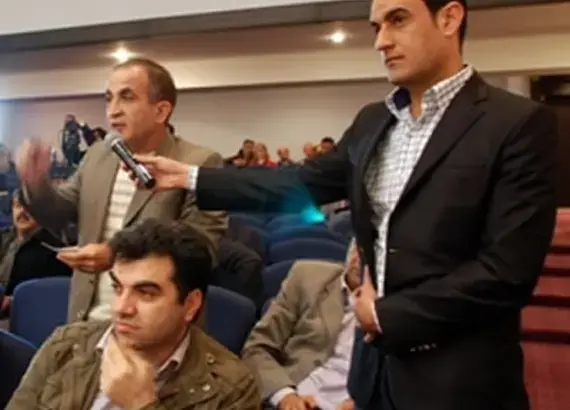
Success Story
Citizens and Candidates Connect at Iraqi Election Forums
In anticipation of national elections on March 7, Iraqi civil society activists held 16 candidate forums throughout the country to engage voters in the political process, improve the dialogue with candidates and focus attention on priority issues for voters, such as water, electricity and education.
The forums, organized with support from NDI, were held Feb. 22 — March 1 in 16 of Iraq's 18 provinces. Candidates from the major political coalitions and parties in each province were invited to participate. A total of 71 parliamentary candidates, including 14 women, presented their platforms and responded to questions, described their proposals and conveyed broader messages to an audience of potential supporters. More than 1,700 citizens attended the forums to ask questions and engage with the candidates. More than 50 Iraqi media outlets, ranging from local newspapers in Anbar province to nationwide satellite television channels, covered the gatherings.
The forums began with two-minute opening statements from each candidate. The moderator then asked a series of questions informed by the community surveys conducted earlier in the month. Citizens were then able to ask questions of the candidates. Finally, the candidates provided closing statements. The moderators strictly enforced time limits, allowing one minute for questions from citizens and two minutes for responses by candidates.
In Sulaymaniyah, more than 250 people attended the forum and asked questions about topics ranging from candidates' plans for improving education to working to represent Kurdish interests in the Council of Representatives (CoR) in Baghdad. In Missan province, an audience of more than 100 people listened to four candidates from the major electoral coalitions and asked about issues ranging from their plans for collaboration with non-governmental organizations to their policy prescriptions for improving the public system for food distribution. In Baghdad, an audience of more than 100 people questioned six candidates on their views of women's participation in politics, their plans for fighting corruption and which parliamentary committee they would seek to join if elected.
NDI trained a core group of civic activists from across Iraq to plan and implement the candidate forums. Known as the Mubadiroon ("Initiators"), the activists have been working with NDI since 2007 to develop skills in community mobilization and advocacy. In January, they participated in NDI trainings that covered the importance of ground rules for the audience and candidates, appropriate venues and stage configurations for hosting the forums and time limits for questions from citizens and answers from candidates.
In early February, the Mubadiroon designed short surveys to gauge public interest in issues such as infrastructure, security, education and health, which NDI's pre-election polling had shown as top priorities for Iraqis. They collected between 200 and 300 completed surveys in each province, which they used to develop questions for the candidates. With guidance from NDI, the Mubadiroon organized forums in their respective provinces. They invited citizens, civil society activists and media outlets to attend the events and selected well-respected, non-partisan local journalists to serve as moderators.
In addition to training the Mubadiroon, NDI held a series of trainings in mid-February to prepare candidates and moderators to participate in the forums. Forty candidates attended NDI trainings that helped them to plan for and perform persuasively at the candidate forums. An expert who has been involved with presidential debates in the United States since 1984 led a training for the moderators and a full-scale simulation to prepare the moderators and event organizers for implementing the candidate forums.
Read more about the March 7 elections in Iraq:
Pictured above: An audience member in Erbil asks a question of the candidates.
Published on March 5, 2010



